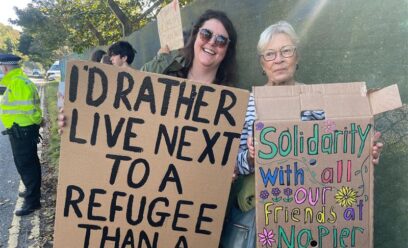Five reasons to celebrate this International Women’s Day
Posted by Katherine Maxwell-Rose on March 7, 2019To mark International Women’s Day this year, we want to thank all the many different incredible women that we get to work with in the refugee and migration sector. Their dedication, passion and vision is making a real difference, helping the UK to become a more welcoming and open place for all those who make their home here. Below are the stories of just five of these awesome women – we think they are a pretty good reason to celebrate today.
Aderonke Apata
Founder, African Rainbow Family
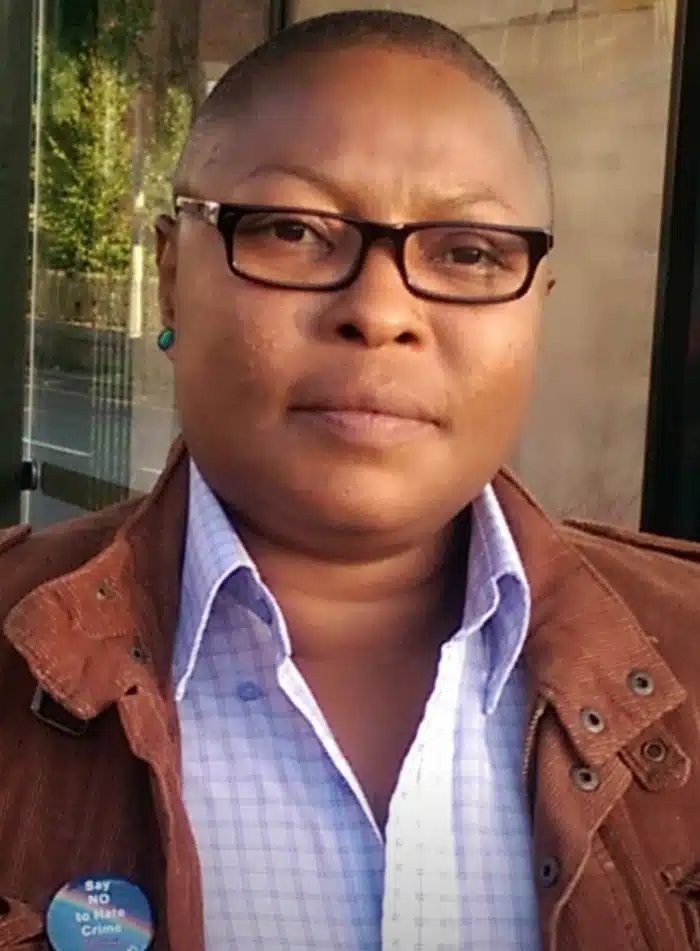
No-one wants to leave their home. It’s painful being separated from your family and not being able to see them. I would love to be home and it makes me sad not to be there but it is so homophobic and draconian, it is impossible.
I was prosecuted as a lesbian in Nigeria and had to flee the country for my own safety. My initial experiences of this country were not pleasant. Having been in the closet in my own country, I was expected to be ‘out’. I was being judged by a Western-world standard but I was coming from a country where it was not acceptable to be LGBTIQ. How was I meant to come to a strange land and open up straight away?
I’m the founder of African Rainbow Family (ARF) which supports LGBTIQ people of African heritage who are seeking or have sought asylum. We campaign for global LGBTIQ freedom and equality as well as on behalf of those seeking asylum in the UK on the basis of their sexuality. Alongside my voluntary role at ARF, I am studying a post-graduate Law degree to fulfil my ambition of becoming a barrister.
I personally believe that I can do anything! I don’t see that there are challenges for me. If I want to do it, I will make it happen. But in supporting people seeking asylum, I have seen so many challenges.
Going to another country, having to prove who you are and the discrimination you face is huge. So many people live in fear of being detained or deported; and even when they receive asylum they are tired. It takes a lot of resilience to strive.
My greatest achievement is that I have been able to influence the asylum process and bring a change to it. Also that I made it through my own campaign to stay in the UK; it took 13 years to go through the asylum system and it was hell. But I’ve also made new friends here who have become family to me; who have shown me love.
To women today celebrating International Women’s Day, stay strong and take courage, don’t give up on anything. We will make it; it may take time but we will get there. Believe you can do it.
I’ll be celebrating with my African Rainbow Family community raising awareness of our plight but also spreading the love!
Reem Doukmak
Community Participation Officer, Coventry Refugee and Migrant Centre
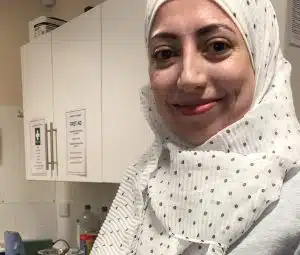
I arrived here five years ago to study for a PhD at Warwick university. I came after the war started in Syria. It’s been great to come to a safe place but at the same time my mind is back home. It’s been a positive experience but not an easy one.
The best thing that has happened to me is being able to survive the war. At some points I thought that it was the end. Having the chance to live in peace again is a blessing – not many people have got that.
Surviving is an opportunity as well as a challenge; others can see there is hope through you. Whatever you faced, you went through it, you were able to survive. You have to remind yourself of that, of your own resilience.
I work on CRMC’s Integration Project with both the VPRS (Syrian Vulnerable Persons Resettlement Scheme) and VCRS (Vulnerable Children’s Resettlement Scheme). I support newly-arrived families to the UK settle and become part of the community. As part of my role, I help people explore and learn about Coventry, think about their own wellbeing and future as well as organise regular activities and events so they can share their own culture too.
Last year I co-ordinated the publication of the cook book, A Taste of Syria which includes recipes and stories written by women on the project. You can feel the sense of hospitality in it. People have a feeling of home when they share food and stories; the women were also keen to show gratitude to the place that welcomed them.
On International Women’s Day, I’m going to join in with some of the local events in Coventry. I’m not just interested in hearing about successful women but the women in the middle trying to cope with all their different challenges. I want to listen to their stories and learn from them.
Women are hard-working and do a lot for their families; they can forget how important their work is and downplay it. They do more than they speak about. I want them to appreciate their contribution, to really think about it and give themselves a moment of gratitude.
I want the women in Syria back home, left in the war and all its implications to remember that they are strong and inspirational. They are leaders wherever they go. With their love and passion to make the world better, they will survive.
Andrea Vukovic
Project Director, Asylum Matters
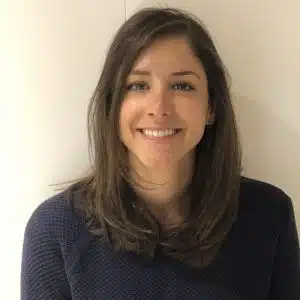
After only a few years in the UK, we moved to Canada, But ten years ago, I came back – this time to complete a master’s degree in London. I haven’t left since and now call the UK my home.
I’m the Director of Asylum Matters which exists to improve the lives of refugees and people seeking asylum through campaigning for positive change. We work with a broad partnership network to tackle some of the most pressing issues affecting people in the asylum system.
We’re a small, dedicated (currently all-female!) team which I think really punches above its weight. For example, together with our partners at Refugee Action, we’re currently leading the Lift the Ban campaign – a 160 members-strong coalition which is calling for people seeking asylum to be given the right to work. It’s achieved real momentum since we launched, with the Government reconsidering its current ban on working, and is just one example of how much more effective we can be when we work together.
There are many inspiring women leaders in the sector driving campaigns on some of the most pressing issues of our time. But we still come up against challenges in ensuring our voices are heard and given equal weight. Women can be less likely to put themselves forward or take credit. So it’s important that we lift each other up and having a network of female role models is a great way to share advice and experiences.
My message today for other women celebrating International Women’s Day is nothing about us, without us.
It’s up to us to ensure our voices are central to defining the change we want to see on the issues which will impact on our lives, like gender equality or climate change.
We try to abide by that principle at Asylum Matters, and ensure that the disadvantaged and under-represented groups we work with are part of creating the solutions we want to see.
This International Women’s Day I’m joining the women’s march Bologna, Italy, with my sister where she lives with her family – she is also a campaigner and an eternal ‘woman on the move’!
Eiri Ohtani
Project Director of The Detention Forum
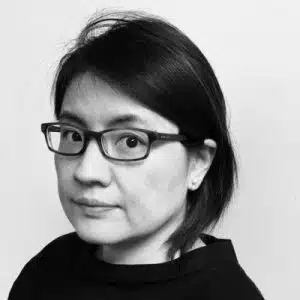
I’ve always felt like an outsider even as a child – actually quite happily – and was itching to leave. For me, Japan was and remains a place of suffocating norms, particularly for women and girls, with rampant sexism and sexual harassment which is becoming subject to public debate only now.
After a few years in an international school in Germany – where I used to read a dictionary in an attempt to learn English as quickly as I could – I moved again to London to do my degree. I had an option of going back to Japan to live a life of a conventional elite: at that time, kids growing up abroad had preferential pathways on their return, which is what almost all the Japanese kids I used to know in Germany opted for. That’s one of the many what-ifs in my life.
I chose to remain in cultural exile away from Japan and to find the way I wanted to live. In pursuing that freedom, there are sacrifices. After all these years, I still miss the language I was born into and was immersed in and have a full and total command of. Needless to say, I miss the food. And I know I won’t be able to look after my ageing parents, who recently returned to Japan from Germany, in a way I would like to.
I am Project Director of the Detention Forum. It’s an advocacy network established in 2009 to challenge the legitimacy of immigration detention. We’ve been collaboratively campaigning for a 28 day time limit, introduction of community-based alternatives and other measures to drastically reduce the UK’s use of detention.
As a woman of colour, your starting point is invisibility. And as a woman of colour, your labour is often taken for granted. I only started realising my race after I moved to Europe, and to say it was a shock is an understatement.
But it’s also my advantage, that I share that experience of marginalisation and exploitation with migrants whose rights and dignity are central to my work. Of course, I am acutely aware of my privileges, but knowing that sense of deep fury that stems from experience of discrimination many migrants face grounds me in what I do.
The opportunity, let’s say of someone ‘on the move’ working in this sector, is that my field of vision for migration doesn’t stop at Dover. My own history of migration and awareness of how my race positions me in this world, I hope, gives me a critical overview and appreciation of human mobility.
I am proud that challenging immigration detention is now firmly on the political agenda through the collaborative work of the Detention Forum. It has taken 10 years: working out a joint strategy with so many organisations was difficult and many were convinced that immigration detention was always going to be an untouchable subject matter.
Knowing the devastating impact of immigration detention on people on the move and thinking it could have happened to me, I could not walk away from it.
The government has finally recognised that detention is a problem and has closed four detention centres, reducing by almost 40 per cent the numbers of migrants locked up. The government has also agreed to our proposals to work with civil society to develop alternatives to detention that allow migrants to live with dignity in the community. With so many more people involved in pushing for change, I believe that even more radical change will eventually come.
One of the greatest gifts of humanity is ability to imagine. Today is an occasion for all of us to reflect on the interlocking systems of oppressions and start building solidarity that is borderless in every sense of the word.
Crina Morteanu
Project Manager, Luton Roma Trust
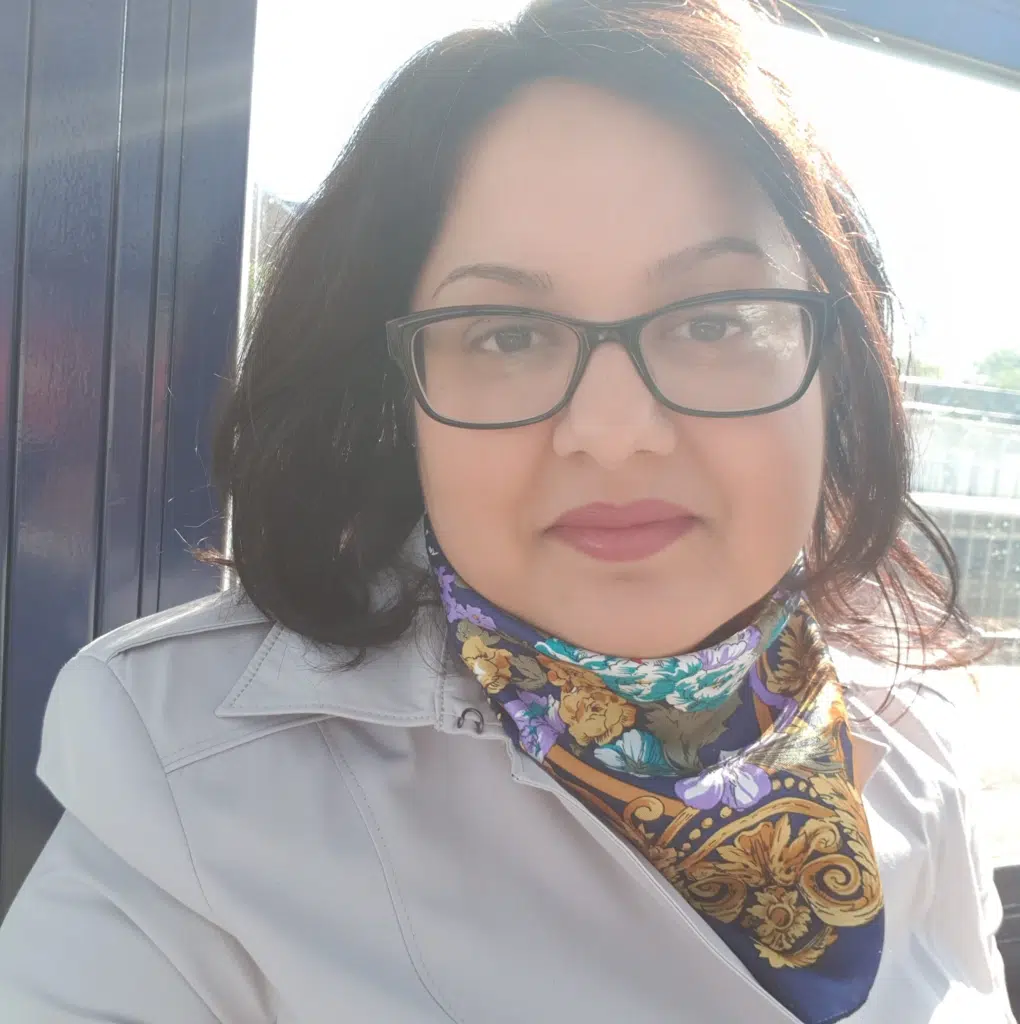
I decided to come to the UK in 2017 after my mandate with the Romanian Ministry of Justice as a Human Rights Adviser in Romania ended. I felt I simply could not identify myself with the new political system. I decided to look for further development opportunities in the UK including furthering my education at PhD level. After arriving here, I encountered many challenges in relation to the recognition of my studies and in finding a relevant job for my education and work experience. I was an interpreter and then a teaching assistant in a nursery.
One of my greatest achievements so far is the fact that I have got a good education, despite so many challenges I had to pass through, to achieve it.
Now I work as a Project Manager for a charity based in Luton which is called the Luton Roma Trust. In this position I oversee project delivery, as well as the overall management of the charity. I manage a variety of different educational and integration projects including an initiative where we teach Roma children music hoping that they will become role models for their community; supporting young Roma to fulfil their dreams by helping them to get a better job or continue their education; and also supporting Roma children get enrolled at school.
One of the particular challenges I have to deal with on a daily basis is the attitude of people in relation to the Roma community. For some, it is simply difficult to understand that there are no differences between the Roma and the majority. In order to understand the Roma someone needs to first understand their history. Do not judge them without knowing the hurdles that they had to pass through since they have arrived in Europe and the discrimination they are encountering on a daily basis in all areas of public life.
My greatest challenge is to change opinions of the Roma people. The actual perception is that Roma are uneducated, lazy, thiefs etc. Through my example, as a successful Roma woman I am able to become a role model for my community but also to break stereotypes around being Roma.
I would like to wish all women a very happy International Women’s Day and to ask them to never give up their dreams no matter how hard they may find it to achieve them.
I will celebrate this special day surrounded by my dearest ones looking forward to enjoying my motherhood to start soon!




